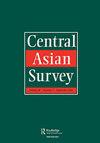Vehicularizing the vernacular: using the periodical press to popularize vernacular languages in Soviet Turkic communities
IF 1.1
3区 社会学
Q2 AREA STUDIES
引用次数: 0
Abstract
ABSTRACT The study of language and script change among the Turkic communities of the Soviet Union often focuses on the switch from Arabic to Latin scripts. Less attention is paid to adaptations of the Arabic script to Turkic vernaculars, and to attempts aimed at convincing the literate masses of their usefulness. In the current paper, I aim to do just that. By making use of Turkic-language periodicals from Crimea, Azerbaijan and Uzbekistan, I throw light on the era before Latin. I explore writers’, editors’ and other intellectuals’ efforts to vernacularize written languages and enforce national boundaries along Soviet lines through changes to the dominant script. More than this, I investigate these actors’ use of magazines to convince their readers of new vernacular, language- and territory-based national identities. In doing so, I demonstrate that periodicals became implements of national consciousness creation targeted at the Turkic citizens of the early Soviet Union.白话文的车辆化:利用报刊在苏联突厥语社区推广白话文
摘要对苏联突厥语族语言和文字变化的研究往往集中在从阿拉伯语到拉丁语的转换上。很少注意将阿拉伯文字改编成突厥文,以及试图说服识字群众相信它们的有用性。在目前的论文中,我的目标就是做到这一点。通过使用克里米亚、阿塞拜疆和乌兹别克斯坦的突厥语期刊,我揭示了拉丁语之前的时代。我探讨了作家、编辑和其他知识分子通过改变主流剧本,努力将书面语言本土化,并按照苏联的路线强化国家边界。除此之外,我还调查了这些演员使用杂志来说服他们的读者新的方言、语言和基于领土的国家身份。在这样做的过程中,我证明期刊成为了针对苏联早期突厥公民的民族意识创造的工具。
本文章由计算机程序翻译,如有差异,请以英文原文为准。
求助全文
约1分钟内获得全文
求助全文

 求助内容:
求助内容: 应助结果提醒方式:
应助结果提醒方式:


